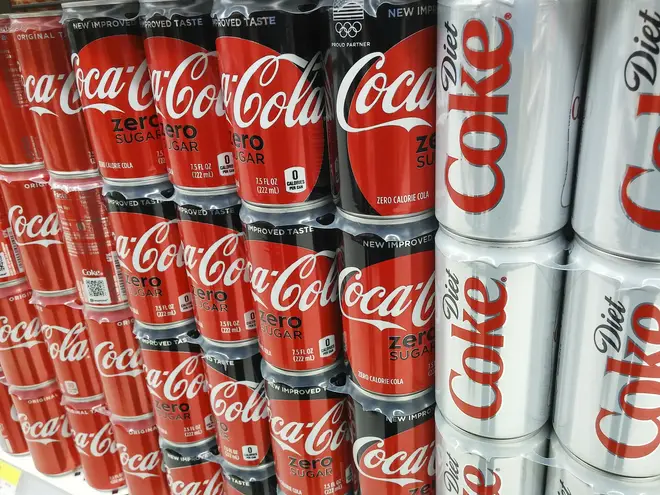
Ben Kentish 10pm - 1am
4 September 2019, 10:26

A study conducted by the World Health Organisation has found that just two diet drinks a day increase your risk of early death by over a quarter.
The World Health Organisation has found that drinking two diet drinks a day increases a person's risk of dying in the next 20 years by 26%.
The global study of more than 450, 000 adults in 10 countries, including the UK, found that drinking artificially sweetened drinks every day is linked to a higher chance of dying young.
The research found that those who consumed two or more 250ml glasses of diet drink per day had a 26% higher risk of dying within the next 16 years.
Deaths from cardiovascular disease went up by 52% if two diet fizzy drinks are consumed per day.
For two or more sugary soft drinks per day, the risk of early death is eight per cent higher.
The WHO scientists from the International Agency for Research on Cancer in Lyon, who conducted the experiment, said it would be "prudent" for people to cut all soft drinks out of their diet.
The study concluded that all types of soft drink are linked with early death, however just two fizzy diet drinks every day actually put people at a significantly higher risk of early death than those who drink full sugar versions.
The WHO also suggested that the "sugar tax" that has been implemented in the UK is likely to increase consumption of diet drinks. They continued that this could be problematic, as the "long-term health implications of these are unknown."
Although previous studies have suggested a link between soft drinks and mortality rates, this is the first large scale study that has highlighted the link.
Dr Neil Murphy, who lead the study, stated "The striking observation in our study was that we found positive associations for both sugar-sweetened and artificially-sweetened soft drinks with risk of all-cause deaths.
He said that although it is unclear what caused the link, but that it could be that diet drinks "may induce glucose intolerance" and trigger high blood insulin levels.
Dr Murphy continued, "Additional studies are now needed to examine the long term health consequences of specific artificial sweeteners that are commonly used in soft drinks, such as aspartame and acesulfame potassium."
The results also dispelled previous studies that said people who drink diet products are more likely to be unhealthy to start with, as the new study found the link between diet drinks and death rates persisted among those of a healthy weight.
Stroke specialist Professor Mitchell Elkind, president elect of the American Heart Association, stated, "The take home message is drink water – certainly avoid sugar sweetened beverages and be cautious about artificially sweetened beverages."
"Water is the safest thing. Tea and coffee are OK. But minimise or completely eliminate processed beverages."